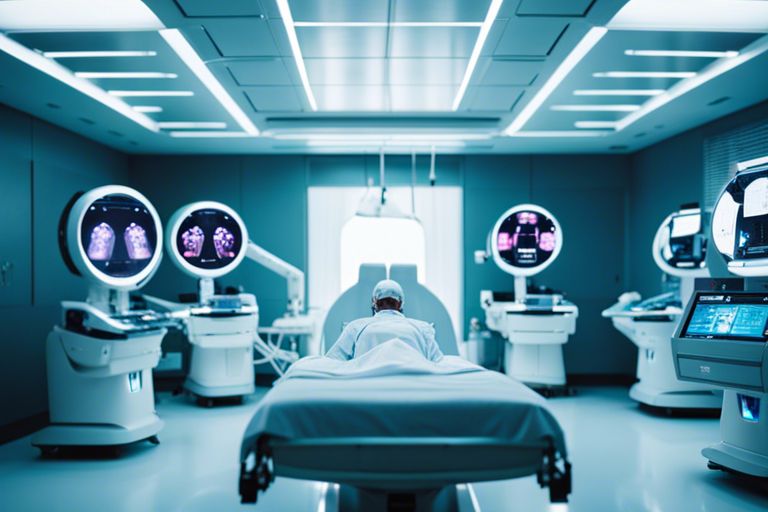Most fascinating is the intersection of artificial intelligence and healthcare innovation, a realm brimming with possibilities and transformative potential. As technology continues to advance at a rapid pace, AI stands at the forefront of revolutionizing the healthcare industry. From predictive analytics to personalized treatment plans, the integration of AI promises a future where medical practices are more precise, efficient, and patient-centered. Join us on a journey to explore the exciting landscape of AI in healthcare innovation and discover how this cutting-edge technology is reshaping the way we approach healthcare.

Key Takeaways:
- AI Augmenting Healthcare: The future of healthcare innovation heavily relies on AI to enhance patient care, optimize operational processes, and enable more accurate diagnostics and treatment plans.
- Personalized Medicine: AI algorithms can analyze vast amounts of patient data to tailor treatment plans based on individual genetic profiles, lifestyle factors, and medical history, leading to more personalized and effective healthcare solutions.
- Ethical Considerations: As AI continues to advance in healthcare, it is crucial to address ethical concerns surrounding patient data privacy, algorithm bias, and maintaining human oversight to ensure that AI technologies are used responsibly and ethically in healthcare settings.

Current State of AI in Healthcare
While AI is still in its nascent stages within healthcare, its potential is generating significant excitement and investment. Let’s explore some of the key areas where AI is making an impact in the medical field:
1. AI-assisted Diagnosis
2. Personalized Medicine and Treatment Plans
3. Drug Discovery and Development
4. Remote Patient Monitoring
5. Predictive Analytics for Patient Outcomes
6. Healthcare Operations and Administrative Efficiency
AI-assisted Diagnosis
Current AI applications in healthcare heavily focus on assisting healthcare professionals in making accurate and timely diagnoses. By analyzing vast amounts of data from patient records, lab results, imaging studies, and research articles, AI systems can help identify patterns and trends that may be missed by human practitioners.
- How is AI enhancing diagnostic accuracy in healthcare?
- What are some examples of successful AI-assisted diagnosis systems?
- Can AI potentially replace human diagnosticians in the future?
- How does AI improve speed and efficiency in medical diagnostics?
Personalized Medicine and Treatment Plans
Treatment plans that are customized to individual patients based on their genetic makeup, lifestyle, and health history are a cornerstone of personalized medicine. AI plays a crucial role in analyzing patient data to tailor treatments for better outcomes, minimizing adverse effects, and optimizing therapy effectiveness.
- How does AI enable personalized treatment plans for patients?
- What are the benefits of personalized medicine in healthcare?
- Can AI help in predicting patient responses to specific treatments?
- What technologies are driving advancements in personalized medicine?
Current advancements in AI have the potential to revolutionize the healthcare industry, from improving diagnostic accuracy to tailoring treatment plans for individual patients. As AI continues to evolve and integrate further into healthcare systems, its transformative impact is set to reshape the way we approach medical care and patient outcomes.
Emerging Trends and Opportunities
Even as AI continues to revolutionize healthcare, new trends and opportunities are shaping the landscape of innovation. Below are some chatGPT prompt samples related to the subsection:
- What are the latest trends in AI applications in healthcare?
- How is AI creating new opportunities for improving patient care?
- Discuss the emerging technologies in healthcare driven by AI.
- What are the potential areas for growth and development in AI healthcare solutions?
AI-driven Medical Imaging Analysis
The advancements in AI technology have paved the way for more accurate and efficient medical imaging analysis, revolutionizing the way healthcare providers diagnose and treat patients. Below are some chatGPT prompt samples related to the subsection:
- How is AI transforming medical imaging analysis?
- What are the benefits of using AI for interpreting medical scans?
- Discuss the impact of AI on improving diagnostic accuracy in healthcare.
- Explain the role of AI in enhancing medical imaging interpretation processes.
The integration of AI algorithms in medical imaging has significantly enhanced the speed and accuracy of diagnoses by providing detailed insights into medical scans, empowering healthcare professionals to make more informed decisions and deliver personalized treatment plans.
Virtual Nursing Assistants and Chatbots
Virtual nursing assistants and chatbots are revolutionizing patient care by providing instant support, guidance, and monitoring outside traditional healthcare settings. Below are some chatGPT prompt samples related to the subsection:
- How are virtual nursing assistants improving patient outcomes?
- Discuss the role of chatbots in enhancing patient engagement in healthcare.
- What are the advantages of using virtual assistants for patient care?
- Explain the potential impact of chatbots on healthcare accessibility and affordability.
Virtual nursing assistants and chatbots are reshaping the healthcare landscape by offering round-the-clock support, answering patient queries, monitoring vital signs, and providing real-time assistance, ultimately improving patient experience and outcomes.
Based on the article title “The Future of AI in Healthcare Innovation,” it’s evident that AI is becoming a cornerstone of transformative healthcare solutions. This informative piece explores the potential implications of AI in revolutionizing healthcare practices, echoing the captivating style of Malcolm Gladwell, known for his intriguing insights and intellectual narratives.

Overcoming Challenges and Barriers
Not without its hurdles, the integration of AI in healthcare innovation faces several challenges that must be addressed to fully realize its potential. These obstacles range from data privacy concerns to ensuring transparency and explainability in AI decision-making processes.
- How can AI technology in healthcare overcome data privacy challenges?
- What are some barriers to the integration of AI in healthcare innovation?
- How can healthcare organizations address the ethical concerns surrounding AI implementation in patient care?
Addressing Data Privacy and Security Concerns
Privacy in healthcare is paramount, especially when utilizing AI technologies that handle sensitive patient data. Safeguarding this information from breaches and ensuring stringent security measures are in place is crucial to build trust in AI-driven healthcare systems.
- How can healthcare institutions ensure the security of patient data when implementing AI systems?
- What are some best practices for maintaining data privacy in AI-driven healthcare applications?
- How can patients be assured that their sensitive health information is protected in AI-powered healthcare services?
Ensuring Transparency and Explainability in AI Decision-Making
Addressing the ‘black box’ problem in AI algorithms is crucial in healthcare, where decisions impact patient outcomes. Ensuring transparency in how AI reaches decisions and making these processes explainable to healthcare providers and patients alike is key to fostering trust and acceptance of AI in medical settings.
- How can AI algorithms in healthcare be made more transparent to clinicians and patients?
- What strategies can be employed to ensure explainability in AI-driven healthcare decisions?
- Why is it important for AI systems in medicine to provide clear rationales for their recommendations or actions?
Not just about streamlining processes, the future of AI in healthcare relies on addressing these challenges head-on to ensure the technology’s safe and effective integration into medical practices. And by addressing data privacy and security concerns while enforcing transparency and explainability in AI decision-making, the healthcare industry can pave the way for a future where AI plays a pivotal role in improving patient care and outcomes.
Conclusion
The potential of AI in healthcare innovation is vast and promising. By leveraging machine learning algorithms, predictive analytics, and natural language processing, AI can revolutionize patient care, disease diagnosis, and treatment plans. The future of AI in healthcare is bright, offering endless opportunities to improve efficiency, accuracy, and patient outcomes.
FAQ
Q: How is AI revolutionizing the healthcare industry?
A: AI is revolutionizing the healthcare industry by enabling faster and more accurate diagnosis, personalized treatment plans, predictive analytics for identifying at-risk patients, and streamlining administrative tasks.
Q: What are the key benefits of integrating AI into healthcare innovation?
A: Some key benefits of integrating AI into healthcare innovation include improved patient outcomes, reduced healthcare costs, increased efficiency in healthcare delivery, and enhanced decision-making support for healthcare professionals.
Q: What are some of the challenges associated with the adoption of AI in healthcare innovation?
A: Some challenges associated with the adoption of AI in healthcare innovation include concerns about data privacy and security, regulatory hurdles, the need for specialized training for healthcare professionals, and ensuring the ethical use of AI in healthcare decision-making.

Recent Comments